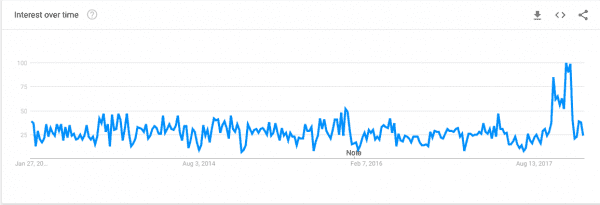
Bill Cosby is facing up to 30 years in prison after a jury convicted him Thursday of assaulting a woman he mentored more than a decade ago. The verdict was hailed as a victory for the #MeToo movement.
All the women who have come forward in recent months to tell their stories of the abusive behavior they’ve endured from famous men has sparked a new level of social awareness around sex and power. It has also prompted new questions about how exactly we define the transgressions we’ve all been reading about.
Unlike the case of Bill Cosby, not all of the men toppled by #MeToo have been accused of a crime.
Google searches for “what is sexual harassment?” reached a five-year high in the final week of November, right after the New York Times exposé on Harvey Weinstein was published, according to Google Trends analytics. It showed a similar spike in searches for “sexual assault” and “sexual misconduct” around that time.

But what do these terms actually mean? Some have panicked that workplace romance is being criminalized. Others have suggested that firing men based on allegations of sexual misconduct is a violation of their constitutional rights.
“In our current climate, to be accused is to be convicted. Due process is nowhere to be found,” wrote novelist Daphne Merkin in a New York Times op-ed.
A lot of the backlash against the #MeToo movement seems centered on a widespread misunderstanding of what, exactly, men are being accused of: Is it a crime? A civil violation? Or is it just sleazy behavior?
Which sexual conduct falls into which category varies. Some of the allegations that have surfaced recently in the press involve all three. Some — like the Aziz Ansari story — are more clearly in the realm of gross (if legal) behavior. And while there are some gray areas in what behavior is illegal, understanding how these acts are defined under the law can offer some clarity and nuance as we navigate the #MeToo moment.
Help our reporting
Have you filed a workplace sexual harassment complaint through the EEOC? Contact [email protected] to share your story and complaint (Vox will not publicly identify you without your explicit consent).
Sexual misconduct
This is probably the most commonly used term in media reports to describe accusations against powerful men. There’s good reason for that: Sexual misconduct is not a legal term, so it’s not referring to specific criminal behavior or even a civil violation (like sexual harassment).
It’s the safest description to use, because it does not necessarily mean that someone did something illegal. But “sexual misconduct” is pretty broad — it can cover everything from asking a work subordinate out on a date to pressuring them for sex in exchange for career advancement. Such imprecise language can leave readers wondering how serious the allegations are and whether the behavior is against the law.
In some cases, though, sexual misconduct can be illegal, depending on the state. Take the accusations against former Sen. Al Franken. At least eight women came forward to accuse the Minnesota Democrat of making unwanted sexual advances toward them. Some of the incidents allegedly involved Franken groping women’s buttocks and breasts.
Many media outlets described the behavior merely as misconduct. But in some states, this type of groping is actually a crime. It’s sexual battery, which is a form of sexual assault.
That’s how it’s viewed in Franken’s home state. In Minnesota, groping can lead to a charge of criminal sexual conduct. Touching a person’s breast or buttocks without their consent — even over clothing — is a misdemeanor, punishable by up to a year in jail and a $3,000 fine. Not all of Franken’s alleged advances took place in Minnesota, and none of his accusers have pressed criminal charges against him.
Sexual harassment
Under federal law, sexual harassment is not a crime — but it is illegal in every state. It is a civil violation, a form of gender discrimination prohibited by the Civil Rights Act of 1964.
From the legal viewpoint, sexual harassment is only prohibited in professional settings. Catcalling or verbally harassing someone on the street is not against federal law, though many states have outlawed certain types of threatening behavior.
The high courts have defined two forms of sexual harassment that are illegal at work. In both, the behavior must be unwelcome to be against the law.
The first is called quid pro quo harassment. In these scenarios, a person in a position of power demands that a subordinate tolerate harassment (like groping and sexual requests) to keep his or her job, or to get a salary raise or other job benefits. These are the most obvious cases and the easiest to prove. It only has to happen once to be illegal.
The second form of illegal harassment is more subjective. It’s behavior that is “severe or pervasive” enough to create a hostile work environment for the victim. This is open to interpretation, because there is no definition as to what makes harassment severe or pervasive enough to create a hostile work environment. Instead, juries and judges are supposed to consider how often the behavior happened, whether it was physical or verbal, whether the perpetrator was a supervisor, whether more than one person participated, and whether a reasonable person would view the behavior as offensive.
Lawsuits describing the second form of harassment are the ones that federal judges are most likely to dismiss.
In the past three decades, federal judges have created a high bar for what the courts consider harassment that is “severe and pervasive” enough to create a hostile work environment, says Sandra Sperino, a law professor at the University of Cincinnati and co-author of the book Unequal: How American Courts Undermine Discrimination Law.
“It’s shocking,” Sperino told Vox. “You read about women being groped or rubbed against a lot at work, and judges don’t think that creates a hostile work environment.”
A law that is open to that much interpretation makes it hard for victims to get legal compensation. It helps explain why less than 2 percent of job discrimination lawsuits — a category that includes sexual harassment — make it to a jury and why only about 4 percent end up awarding damages to victims.
Sexual assault
All forms of sexual assault are considered criminal behavior under state and federal law. But how, exactly, sexual assault is defined varies by state.
Sexual assault is most often associated with rape, but it’s actually an umbrella term used to describe a number of violent or threatening sex crimes, from rape to unwanted fondling and groping. This is what Cosby was found guilty of doing to Andrea Constand.
The US Justice Department, which can prosecute these cases, considers sexual assault “any type of sexual contact or behavior that occurs without the explicit consent of the recipient.”
The US Code views unwanted physical touching and penetration to be criminal actions. But touching someone’s genitals is a far more serious crime than touching other intimate parts of a person’s body. So under federal law, sexual assault must involve some physical contact. Making sexualized comments, or even exposing oneself, is not considered sexual assault under federal law (though it can be considered sexual harassment if it happens at work).
Where it gets confusing is on the state level.
“There’s a lot of variation in every state’s legal code on what [sexual assault] is,” said Laura Palumbo, communications director for the National Sexual Violence Resource Center. “Some states don’t even call it sexual assault.”
In most states, groping is a misdemeanor crime that is considered sexual battery. But which kind of groping is illegal also varies from state to state, writes Joanna Grossman, a law professor at Southern Methodist University.
In a column for Vox, she explained it this way:
In states like Minnesota, exposing one’s genitals to an unwilling audience (as comedian Louis C.K. admitted to doing) is considered a crime.
Many critics of the #MeToo movement have defended men like C.K. and Franken. Their defense is often centered on the lack of “due process” before they were fired from their jobs or booted from work projects. But due process is another legal term — the right to a fair trial when charged with a crime.
None of the men accused so far are facing criminal charges, and they don’t have the right to due process in workplace investigations.
Help our reporting
Have you filed a workplace sexual harassment complaint through the EEOC? Contact [email protected] to share your story and complaint (Vox will not publicly identify you without your explicit consent).
Sourse: vox.com






